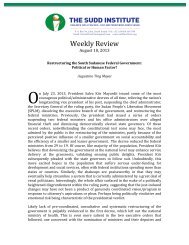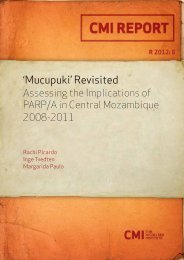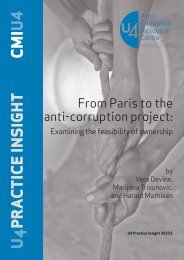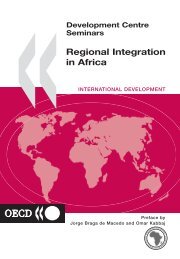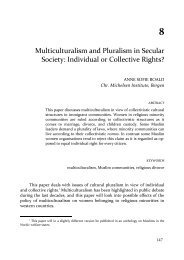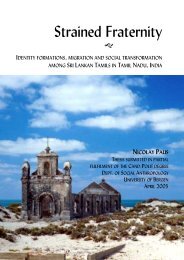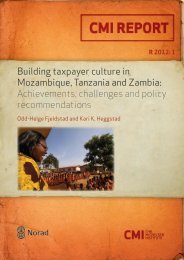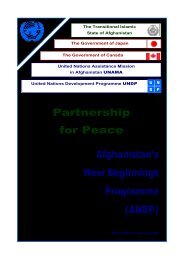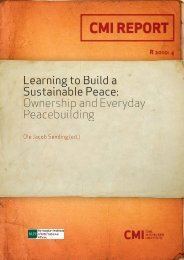Download (pdf) - CMI
Download (pdf) - CMI
Download (pdf) - CMI
You also want an ePaper? Increase the reach of your titles
YUMPU automatically turns print PDFs into web optimized ePapers that Google loves.
<strong>CMI</strong> REPORT DECENTRALISATION AND GENDER R 2008: 9<br />
2. Case one: Ileje District Council<br />
By Siri Lange and Rehema L. Mwateba<br />
2.1 Socio-economic situation<br />
Ileje district is situated in the Southern Highlands, in the South East of Mbeya region. 8 The district<br />
borders to both Malawi and Zambia, and there are frequent interactions across the borders. The<br />
district covers almost 2000 sq.km. of which half is arable land. The southern part of the district is<br />
very mountainous and the roads in those areas are impassable during the rainy season. The altitudes<br />
range from 1360 to 2500 meters above sea level. The majority of the population are subsistence<br />
farmers. The level of income generating activities is low, but there is some cash crop cultivating,<br />
particularly of coffee, cardamom, bananas, and sun flowers.<br />
The population of Ileje is estimated to have been around 113 thousand in 2004. The main ethnic<br />
groups of the district are Ndali and Lambya, but there are also Malila, Nyiha, Nyamwanga and<br />
Nyakyusa. The district has a high proportion of Morovians. There are also a number of other<br />
Christian denominations as well as some Muslims (mainly teachers). The income per capita is low,<br />
around Tsh. 115,000 per year. The team was informed that poverty is rampant but that awareness of<br />
the usefulness of social development is high, since they have involved many NGOs for sensitization<br />
on various issues. The educational level in the district is not very high.<br />
2.2 Gender relations<br />
The district is dominated by patriarchal ideology/male chauvinism (mfumo dume). Very few men<br />
involve women in decision making, and “men stand to be main decisions makers and holders of<br />
household economic wealth”. 9 Traditionally, women are not allowed to keep their own income, but<br />
the practice varies, and the workload for women is said to be lower than in many other districts.<br />
Women’s lack of economic freedom means that in cases where the husband is away and the wife or<br />
a child fall ill, the wife can not sell a chicken because the household property belongs to the man.<br />
Customary laws are adhered to, and wife inheritance (brother marrying his deceased brother’s<br />
wife/wives) is not uncommon. 10 Most women in Ileje do not have a say regarding how many<br />
children she should have. Only 21% of adults made use of family planning techniqes in 2005. 11<br />
2.3 Cooperation within the district council<br />
Decentralisation by devolution<br />
The district headquarters are located in Itumba township. Ileje entered the Local Government<br />
Reform, LGR, in 2003. LGRT arranged a stakeholders’ workshop in the council where political<br />
parties, business people etc participated. Together they made a vision and mission for the council,<br />
8 This section is based on interviews in February 2007 as well as the Annual Plan of the Tanzania Government and<br />
UNICEF new country programme (Tanzania Government and UNICEF new country programme. Ileje District Council.<br />
CSPD Annual Plan 2004 and 2005. Ileje District Council 2004).<br />
9 UNICEF/Ileje District Council 2004.<br />
10<br />
The team interviewed one woman who had escaped being inherited by her brother in-law, but who lost any rights to<br />
her late husband’s property in the process.<br />
11 CSPD Annual Plan 2004 and 2005. Ileje District Council 2004). Tanzania Government and UNICEF new country<br />
programme.<br />
9



